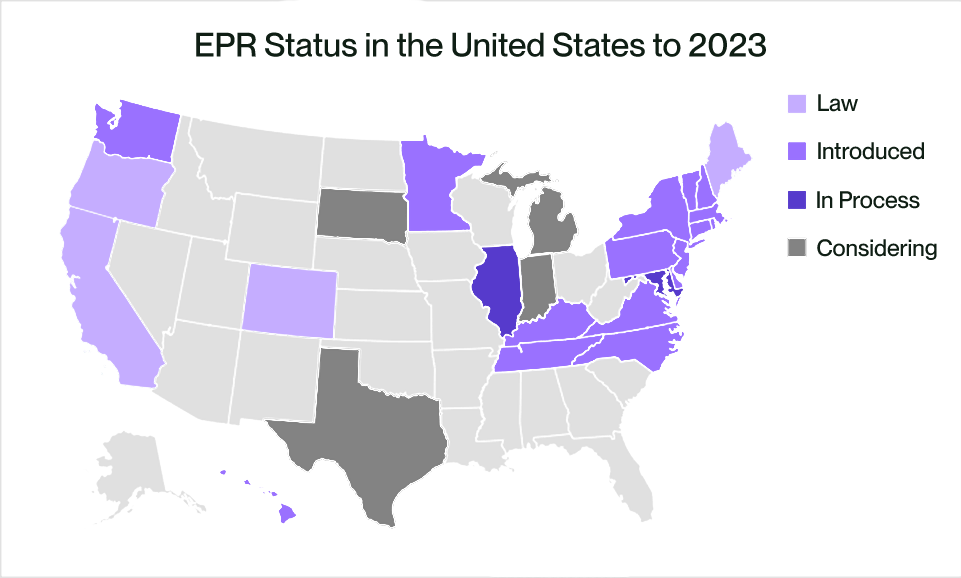In case you missed it, as we’ve entered 2024, we are now one year closer to extended producer responsibility (EPR) for packaging in the United States. But that’s not all. Extended producer responsibility laws are also evolving in Canada and there are major changes coming in the European Union.
If you sell a product that is in a package, as most are, please take a moment and read this update. Under EPR legislation, producers are defined broadly as the entity that places the packaging in the market which includes brands and importers.
A frequent question is “How do they define recyclable?” Details are provided below.
PART 1 – United States
In the United States, California, Colorado, Maine, and Oregon are all working to implement packaging EPR laws, and some recent developments warrant your attention.
California
California is on track to have EPR implemented by 2027. CalRecycle recently completed its covered materials list defining packaging that is considered recyclable in California. The draft regulations also have outlined specific requirements for the use of the “chasing arrows” symbol which has been labeled as misleading by SB 343. Recently, Circular Action Alliance (CAA) was named as the first Producer Responsibility Organization (PRO) for California.
This year, CalRecycle will be busy holding rulemaking workshops. Our recommendation is to visit their website often and pay attention because “what happens in California doesn’t stay in California.”
Colorado
Colorado, notorious for its below average recycling rate, is making progress on implementing its Producer Responsibility Program for Recycling. The Colorado Department of Public Health and Environment has named CAA as the state’s designated PRO. CAA will be responsible for completing the state’s needs assessment and be the administrator of the funding mechanism.
CAA is currently working on setting up the list of items that would be considered “readily recyclable material” in the state. The proposed list includes the packaging material and potential covered categories (formats). The proposed criteria to be deemed recyclable include access, sorting infrastructure and end markets. This process will wrap up in May.
Next up in Colorado will be the needs assessment report, rulemaking and work on the plan proposal. Colorado’s program is set to go into effect on July 1, 2025.
Maine
Maine was the first state to pass an EPR bill for packaging. So far, the Maine Department of Environmental Protection has begun its rulemaking process by releasing its Conceptual Draft Rules, part 1, part 2 and part 3. The rulemaking is not set to conclude until early 2025 when the state legislature is asked to approve them. Approval will lead into the establishment of a stewardship organization.
Maine’s readily recyclable list will not be ready until after the rulemaking is completed in 2025. Considerations such as marketability (aka active recycling demand), throughput (aka sufficient quantity for active sorting) and yield (aka meeting a 60% threshold for material recycling in the state). This definition is not like the others.
Maine’s program will take effect in 2026.
Oregon
Oregon’s Plastic Pollution and Recycling Modernization Act came into effect in 2022. By July 1, 2025, producers must join a PRO and municipalities will be held to the statewide collection list. Rulemaking is ongoing with meetings scheduled through March 2024.
Oregon’s Department of Environmental Quality has published a decision tree to help determine if an item is a covered product and who is obliged as the “producer” of that item. While it may seem complicated, most cases result in assigning the obligation to the entity that put the item into the market in the state.
Oregon’s recycling acceptance list is unique because it defines what municipalities should be required to accept and what separate PROs should be required to manage. The statewide collection list includes the common items and some plastic items in #1, #2, #4 and #5. PROs will be asked to manage aerosol containers, fuel canisters, glass, shredded paper, and other plastic items that are currently not sortable in municipal systems.
As of this writing, CAA and Reverse Logistics Group have submitted applications to serve as PROs in the state of Oregon. All submissions are due by March 31, 2024.
Needless to say, all of us that are involved in packaging, particularly compliance, will be busy preparing for 2025 and beyond.

Coming Up Next
In PART 2 – Canada, We will review the moves to add additional provinces to the country’s EPR initiative.
In PART 3 – European Union, We will dive into the changes as the European Union moves from an EPR directive to an EPR regulation. The good news is that the regulation will bring harmony to the member states.
In PART 4 – Getting Prepared, We will offer a roadmap on how to you can get ready for EPR.
We are the world’s leading purpose driven, digitally enabled, science-based activator. And always welcome inquiries and partnerships to drive positive change together.

